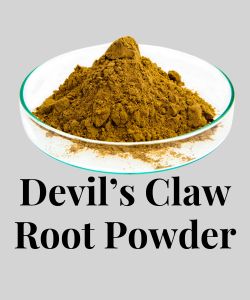5 Devil’s Claw Tea (Harpagophytum procumbens) Side Effects
Africa’s Devil’s claw plant is botanically known as Harpagophytum procumbens. The herb grows in the Kalahari Desert of Southern Africa.
Natural compounds in this plant possess anti-inflammatory and analgesic properties. This gives the plant a reputaion for relieving severe pain. However, there are possible side effects associated with pro-longed used of the Devilss’s claw plant.

Indigenous peoples have used this plant for its medicinal properties for centuries. The name “devil’s claw” comes from the appearance of its fruit, which has hooks or claws on it.
Devil’s Claw Side Effects
While devil’s claw is generally considered safe for short-term use, consuming devil’s claw tea or supplements may cause side effects in some individuals. Some potential side effects include:
- Digestive Issues: Some people may experience digestive discomfort, such as diarrhea, stomach upset, or nausea.
- Allergic Reactions: Symptoms of allergic reaction to Devil’s claw may include rash, itching, swelling, dizziness, or difficulty breathing. If any allergic reactions occur, seek medical attention immediately.
- Blood Pressure: Devil’s claw may have effects on blood pressure. Individuals with blood pressure concerns or those taking medications for blood pressure regulation should use devil’s claw cautiously and under medical supervision.
- Interaction with Medications: Devil’s claw might interact with certain medications such as anticoagulants (blood thinners), antiplatelet drugs, and medications metabolized by the liver. It’s crucial to talk with your healthcare professional before using devil’s claw if you’re on any medications to prevent potential interactions.
- Pregnancy and Breastfeeding: There isn’t sufficient evidence regarding the safety of devil’s claw during pregnancy and breastfeeding. It’s typically recommended to avoid its use during these times due to the lack of extensive studies.
In addition to the side effects listed above, some users have reported headaches, ringing in the ears (tinnitus), loss of appetite, and changes in blood sugar levels. So, always start with a small amount of devil’s claw tea to check for any adverse reactions.
Devil’s Claw Plant Uses And Benefits
The root of the devil’s claw plant is used in herbal medicine because they contain active compounds such as harpagoside, harpagide, and procumbine.
What is Devils claw used for? The root of the Devil’s claw root tea is primarily used as a natural remedy for pain.
It is used to reduce inflammation associated with arthritis, osteoarthritis, rheumatoid arthritis, and other musculoskeletal disorders. The tea is also taken to reduce fevers and relieve urinary tract infections.
The plant’s root is often taken in the form of capsules, tablets, extracts, or herbal teas.
How to Prepare Devil’s Claw Tea
Devil’s claw tea is made from pieces roots from the plant or from Devil’s claw root powder. Making the tea is relatively straightforward. Here’s a guide to make devil’s claw tea using dried devil’s claw root:
Ingredients
- 1 teaspoon of dried devil’s claw root (you can adjust the quantity based on your preference)
- 1 cup of water
- Honey or lemon (optional, for flavor)
Directions
- Boil the water. Once the water reaches a rolling boil, remove it from heat.
- Place the dried devil’s claw root in a teapot or heat proof container.
- Pour the hot water over the dried devil’s claw root.
- Cover the container and let the mixture steep for about 5 to 10 minutes. Steeping time can vary based on how strong you prefer your tea.
- After steeping, strain the tea to remove the pieces of devil’s claw root. You can use a fine mesh strainer or a tea infuser.
- If desired, add honey or lemon to enhance the flavor.
- Your devil’s claw tea is now ready to drink.
Where to Buy Devil’s Claw
When purchasing devil’s claw root or any herbal supplement, it’s crucial to buy from reputable sources to ensure the quality and authenticity of the product.
In addition, it’s a good practice to read customer reviews and check for certifications or quality standards. Here are a few places you may buy Devel’s claw products:
| Health Food Stores | Many health food stores and natural food markets carry a variety of herbal supplements, including devil’s claw plant in different forms. |
| Online Retailers | Websites like Amazon, iHerb, Vitacost, Etsy and other online health retailers often offer a wide selection of herbal supplements, including devil’s claw plant products. |
| Specialty Stores | Some specialty herbal shops or apothecaries may have devil’s claw root available in various forms, such as loose dried roots or capsules. |
| Pharmacies and Drugstores | Some pharmacies or drugstores with a wider selection of natural health products might carry devil’s claw supplements or teas. |
Conclusion
Devil’s claw root is renowned for its medicinal uses. The plant is sourced from the Kalahari Desert. Devil’s claw plant is found in various forms like dried roots, capsules, and teas, US health stores, online retailers (Amazon, iHerb), Etsy, and some pharmacies.
When purchasing Devil’s claw plant products it is important to look for high quality sourcing and certifications.
Potential side effects include digestive discomfort, rare allergic reactions, and possible interactions with medications, particularly blood pressure drugs and anticoagulants. Pregnant or breastfeeding individuals should use caution.
Always stick to recommended dosages and seek professional advice before use, especially if managing health conditions or taking medications for safety and efficacy.
Disclaimer: This website is for informational purposes only. Nothing on this site is to be viewed as medical advice. Please talk with a professional healthcare provider about matters relating to medical treatment.

